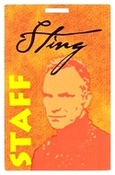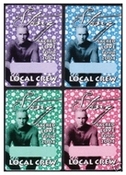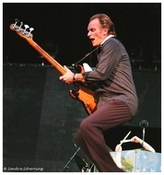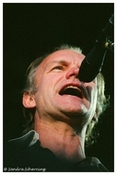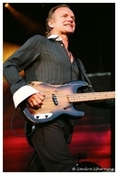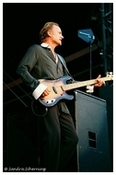
Englishman in New York - Sting mixes styles and rhythms in Wiesbaden's Kurpark...
"I'm happy to be with you," the man in a casual shirt and trousers casual outfit stammers in friendly, almost accent-free German. Gordon Mathew Sumner, aka "Sting," won't use too many words during his performance in Wiesbaden's Kurpark over the next two hours.
"Send Me Your Love" is the title of the upbeat opening song, like much else from the current album "Sacred Love." It's primarily about love, of course, but also about the future of the entire world and the illusion of being able to forget all your worries for an evening.
The 52-year-old singer, bassist, and composer disappoints no one—neither fans of jazz and swing nor fans of gentle pop and rock. He masterfully blends styles and rhythms, bringing a surprising amount of soul to 'Whenever I Say Your Name,' and allowing himself excursions into jazz-rock with the courage to offer extended improvisations with his excellent backing ensemble. The ode to the late British gay rights activist Quentin Crisp, 'Englishman in New York,' is also on the program, as is the more than quarter-century-old plea to his beloved prostitute 'Roxanne' not to turn on the red light in the window. The jazzy-ballad-like 'Fragile' is timelessly beautiful, and the audience eagerly awaits the swinging divorce evergreen 'Every Breath You Take' from the blissful era when 'Sting' still manically led the legendary trio Police, from which he split 20 years ago.
There? No one will doubt that the current material was created under the impression of the terrorist attacks of September 11, given the digitally animated, burning oil fields being attacked by war bombers. However, "Sting" doesn't make terror its subject, at most it portrays the mood that affects all of our lives.
(c) Frankfurter Allgemeine Zeitung by Michael Köhler
A gentleman in New York...
And in Wiesbaden: Sting strings together hit after catchy hit in the Kurpark and, miraculously, still doesn't seem too routine.
Let's get straight to the point: He still looks good. While age hasn't left Sting unscathed, he wears it with dignity, with slightly longer hair that falls casually back in the style of a mature playboy, and a superior, almost mocking smile. Perhaps this is his response to recent critics questioning the carrying power of his voice, but fundamentally, that's unlikely. Because Sting the musician has long since ceased to live in the here and now. In all his years as an author of pop history, in all his years on stage, first as the frontman of the Police, then later on his own, he has achieved timelessness. Timelessness that grows out of familiarity, out of our certainty that Sting has somehow always been there and always will be. And this is also the result of his musical poetics, which doesn't cling to fashions or yearn for juvenility bar by bar.
Thus, Gordon Matthew Sumner, born Sting in Newcastle in 1951, managed to retain his pop face even in his mid-fifties. He hasn't become his own caricature like Mick Jagger, Ozzy Osbourne, or Steven Tyler, who in turn sneer at Sting's affair-free impeccability—"It could be worse, I could be Sting," Osbourne once said. Nor does he simply draw on the aura of old, years-unmatched eras like Paul McCartney. And he doesn't freeze in virtuoso solidity like Eric Clapton. He is the elder statesman of his genre, the good conscience of pop music, whom people listen to again and again because he doesn't just talk about the past, and because he doesn't deny his experience, his history, his knowledge just to appear younger, hipper.
Hardly a bad word is said about Sting in the general pop discourse; people can agree on him despite, or perhaps because of, his conciliatory, almost smooth tone. Perhaps also because he was never important enough to Bob Dylan, for example, who once stood for much more than just music and who is therefore doubly resentful of any weaker work. Sting is remembered above all as a musician, technically sound, charming, fluent, melodic, and still smiling quietly even in the turmoil.
That is also his best role in Wiesbaden, which was able to chase away the dark rain clouds just in time and send the evening sun into the spa gardens. Without any further staging or posturing, he stands on stage with his shirt open and delivers a cross-generational mainstream, perfect in its own way and, like all perfection, always a touch boring. He doesn't even allow himself to be carried away by lengthy announcements; the music does the talking for him, starting with the newer material, but quickly the eternal melodies, non-stop, almost breathlessly, stuck together as if in a medley: 'Roxanne,' 'Walking On The Moon,' 'Englishman in New York,' and all the other Sting hits, still not noticeably routine, a miracle, really.
This is largely due to the fact that Sting has a band of fantastic musicians around him who are actually far too good for the format-packed pop music of the Commander of the British Empire, to which the Queen has just appointed him. And because Sting knows this, he sometimes lets them go, letting them break into a piece like 'Roxanne' in a unique way, even going against the grain, and contenting himself with the unfamiliar role of listening sideman.
In any case, Sting presents himself with a typical, almost calculated openness – open to a bit of jazz, open to a bit of world music, which is expressed primarily as rhythmic colour. But the musical approach never becomes so open, free, and experimental that it threatens the mainstream.
He is thanked for this in Wiesbaden with quiet, but by no means boisterous, adoration. Around 10,000 people, young and old, men and women, sway to the beat, memorizing the lyrics, delighted that Sting is catering to their longing for memories. There's no fear of riots; everything remains civilized, just as the music is civilized. Presumably, cigarette butts aren't even thrown on the lawn, because the message Sting whispers in our ears is clear and simple: "I don't want any more crises," he said recently in an interview, "I like being happy and content." At just before 10, right on time for the prearranged appointment to appease the neighbours, we are too. As he bids us farewell, Sting blows us a kiss and bows with his characteristic nonchalance. Just like true gentlemen do.
(c) Frankfurter Rundschau by Tim Gorbauch
June 19, 2004
SET LIST
- Send Your Love
- Synchronicity II
- Inside
- Dead Man's Rope
- We'll Be Together
- Whenever I Say Your Name
- I Was Brought To My Senses
- This War
- Fragile
- Fields Of Gold
- Sacred Love
- Stolen Car (Take Me Dancing)
- Englishman In New York
- Roxanne
- Never Coming Home
- Desert Rose
- If I Ever Lose My Faith In You
- Every Breath You Take
- A Thousand Years






